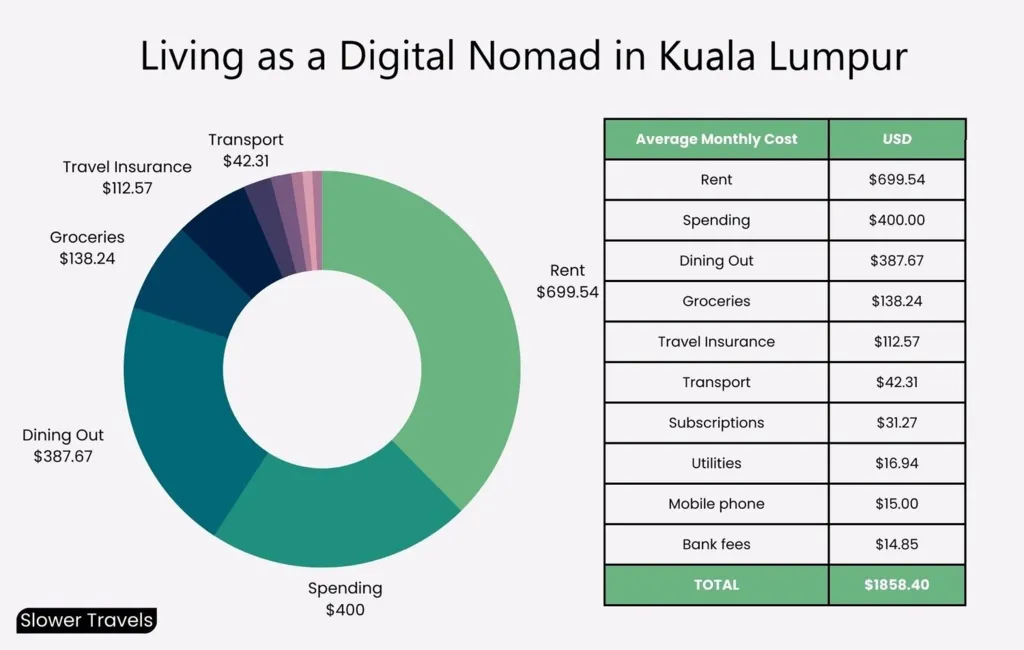Malaysia is fast becoming a favorite hub for remote workers. With the launch of the Malaysia Digital Nomad Policy under the DE Rantau Programme in 2022, the country has opened its doors to global professionals who want to live, work, and spend locally. The impact is already visible, with digital nomads boosting local economies through housing, services, and innovation.
Malaysia Digital Nomad Policy Is Designed for Global Talent
The DE Rantau Programme grants foreign digital nomads a pass to stay between three and twelve months, with an option to renew for another year. Nearly 2,000 applications have already been approved, showing strong interest since its launch.

The number of foreign digital nomads in Malaysia has doubled in one year, rising from 559 to 1,120. This rapid growth highlights the effectiveness of Malaysia’s forward-looking policies and its attractiveness as a digital work destination. The country now ranks 17th globally in the 2025 Digital Nomad Report, placing it firmly on the map for remote workers.
Economic Value of Digital Nomads
Digital nomads are more than just visitors. They contribute directly to the economy through daily spending. In Malaysia, nomads under the program generate around US$20 million annually. On average, each nomad spends US$2,000 per month on accommodation, food, transport, internet, and leisure activities.
Globally, the digital nomad economy is worth US$787 billion, with an average per capita income of about US$22,600. Malaysia’s policies aim to capture a growing slice of this market by offering infrastructure, visa flexibility, and affordable living standards.
Read Also: Malaysia Digital Economy Growth – Trends and Investment Opportunities
Boosting Local Services and Housing
The majority of digital nomads—about 80%—settle in Klang Valley, while others choose Penang and Johor Bahru. This concentration brings noticeable benefits to local services such as co-working spaces, short-term rentals, cafés, and recreational industries.
At the same time, digital nomads can influence housing markets. By reducing reliance on daily commuting, they ease pressure on homes near traditional office centers. This trend could balance housing demand in urban areas, giving secondary cities more opportunities to grow as lifestyle destinations.
Knowledge Transfer and Innovation
The presence of digital nomads brings more than spending. It contributes to knowledge sharing, cultural exchange, and startup activity. Remote professionals often bring global skills and networks, which inspire local entrepreneurs. This aligns with Malaysia’s ambition to position itself as a regional hub for technology and entrepreneurship.
Policymakers believe digital nomads will not only support the economy but also accelerate digital transformation, foster collaboration, and create new job opportunities for locals.
Malaysia Digital Nomad Policy Stands Out
Malaysia combines several advantages for digital nomads. It offers affordable living costs compared to Western countries, reliable internet access, and diverse cultural attractions. Government policies like the DE Rantau Programme give structure and legal certainty, making it easier for nomads to work and contribute without bureaucratic hurdles.
By creating a welcoming ecosystem, Malaysia sets itself apart from competitors in Southeast Asia. While countries across the region are racing to attract remote workers, Malaysia’s mix of affordability, infrastructure, and lifestyle makes it highly competitive.
Malaysia Digital Nomad Policy: The Impact
The success of the Malaysia Digital Nomad Policy reflects broader global shifts in the way people work. With the digital nomad economy set to expand further, Malaysia’s proactive approach could secure long-term benefits. The country is not just hosting remote workers, but reshaping its local economies, housing markets, and innovation landscape. If current trends continue, Malaysia could establish itself as a leading hub for global digital nomads in Asia, driving growth well beyond tourism.
Read Also: Malaysia Medical Tourism Market Soars with Healthy Promise
FAQs
1. What is Malaysia’s Digital Nomad Policy?
It is part of the DE Rantau Programme, allowing foreign nomads to stay from 3 to 12 months, renewable for another year.
2. How many digital nomads are in Malaysia?
The number doubled to 1,120 in the last year, with nearly 2,000 applications approved.
3. How much do digital nomads contribute to Malaysia’s economy?
They generate about US$20 million annually, averaging US$2,000 monthly spending.
4. Where do most digital nomads in Malaysia live?
Around 80% stay in Klang Valley, with others in Penang and Johor Bahru.
5. Why is Malaysia attractive to digital nomads?
It offers affordable living, strong infrastructure, visa support, and cultural diversity.







